You are viewing the Cultures of Knowledge Blog archive for the ‘Websites and Databases’ Category:
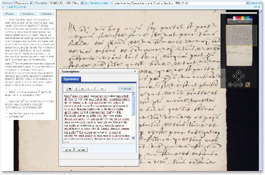 A beta version of the correspondence of the sixteenth-century naturalist Carolus Clusius (1526-1609), developed by the Huygens ING (KNAW) and the Scaliger Institute (Leiden University Libraries), is now available online. Created with eLaborate, the online transcription platform developed by Huygens ING, the site currently features fully searchable transcriptions of 450 letters, but metadata on all known letters together with scans of 1,300 letters in the Leiden University Library are also included. Scholars in the field of the history of science, students of languages and paleography, and anyone seriously interested in the history of botany are invited to participate in the ongoing refinement of the resource, contributing new transcriptions, or improving existing texts. For further information and a link to the beta, please visit the Project webpage.
A beta version of the correspondence of the sixteenth-century naturalist Carolus Clusius (1526-1609), developed by the Huygens ING (KNAW) and the Scaliger Institute (Leiden University Libraries), is now available online. Created with eLaborate, the online transcription platform developed by Huygens ING, the site currently features fully searchable transcriptions of 450 letters, but metadata on all known letters together with scans of 1,300 letters in the Leiden University Library are also included. Scholars in the field of the history of science, students of languages and paleography, and anyone seriously interested in the history of botany are invited to participate in the ongoing refinement of the resource, contributing new transcriptions, or improving existing texts. For further information and a link to the beta, please visit the Project webpage.
On Thursday 3 May Florike Egmond from the Clusius Project will be sharing a paper on Clusius, collecting, and practices of scientific illustration in our third annual seminar series. For her talk and seven other exciting contributions, please visit the seminar webpage.
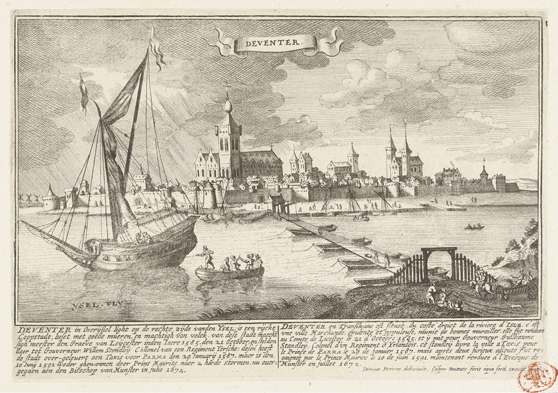 Much of the seventeenth century was blighted by conflict, and the Thirty Years’ War, which stretched the length and breadth of Europe, affected every aspect of life. The implications for educational institutions and resulting intellectual networks and traditions were wide-ranging, and as such the Bodleian cards refer frequently to the effect of the conflict on universities and those teaching and studying within them. For example, in today’s card – sent on 3 February 1641, when war had been raging for over twenty years – John Christenius (1599-1672) laments the ‘injurious effect’ of the pan-European conflict on ‘the quality of the intake and studies at his university’. The original card compiler speculated that this letter might have been written from Deventer (where Erasmus had been at school a century and a half before, and the economic decline of which was attributed to religious war), and in Dirk van Miert‘s Humanism in an Age of Science: The Amsterdam Athenaeum in the Golden Age, 1632-1704 we read that from 1637 Christenius had indeed held a position at the newly formed Deventer Athenaeum. As students rush their work, emerging ‘unfit for a profession or status’, Christenius suggests to Gerardus Joannes Vossius (1577-1649), professor of history at Amsterdam’s Anthenaeum Illustre, that a teacher capable of inspiring the ‘studiously inclined young men to cultivate their minds towards a more scholarly standard’ be found, recommending the appointment of Hamburg-born Johann Frederick Gronovius (1611-1671). This suggestion met with approval and, following travels in England, France, and Italy, Gronovius was duly appointed professor of rhetoric and history at Deventer, a post he retained until his transfer to Leiden in 1658.
Much of the seventeenth century was blighted by conflict, and the Thirty Years’ War, which stretched the length and breadth of Europe, affected every aspect of life. The implications for educational institutions and resulting intellectual networks and traditions were wide-ranging, and as such the Bodleian cards refer frequently to the effect of the conflict on universities and those teaching and studying within them. For example, in today’s card – sent on 3 February 1641, when war had been raging for over twenty years – John Christenius (1599-1672) laments the ‘injurious effect’ of the pan-European conflict on ‘the quality of the intake and studies at his university’. The original card compiler speculated that this letter might have been written from Deventer (where Erasmus had been at school a century and a half before, and the economic decline of which was attributed to religious war), and in Dirk van Miert‘s Humanism in an Age of Science: The Amsterdam Athenaeum in the Golden Age, 1632-1704 we read that from 1637 Christenius had indeed held a position at the newly formed Deventer Athenaeum. As students rush their work, emerging ‘unfit for a profession or status’, Christenius suggests to Gerardus Joannes Vossius (1577-1649), professor of history at Amsterdam’s Anthenaeum Illustre, that a teacher capable of inspiring the ‘studiously inclined young men to cultivate their minds towards a more scholarly standard’ be found, recommending the appointment of Hamburg-born Johann Frederick Gronovius (1611-1671). This suggestion met with approval and, following travels in England, France, and Italy, Gronovius was duly appointed professor of rhetoric and history at Deventer, a post he retained until his transfer to Leiden in 1658.
According to other EMLO records, Gronovius was no stranger to the city. In 1631 he was writing from there and, by January 1644, the scholarly situation at the Athenaeum appears to have improved to such an extent under the auspices of its new star professor that Vossius praises the ‘great flow of good works from G’s. university and hopes that this will stimulate the senators of G’s. city, renowned for its academic traditions and as the place where Erasmus studied, to provide further for the dissemination of the university’s world-wide fame through monumental works of genius and learning’. Although he encountered problems – see the complications concerning one particular ‘homicidal maniac’ – Gronovius found his lectures ‘well attended’, and it’s a relief to find a productive pedagogical outcome despite (or perhaps even because of) the persistent maelstrom of war.
Miranda is editing metadata from the Bodleian card catalogue of correspondence for our union catalogue, Early Modern Letters Online. On a regular basis, she brings us hand-picked and contextualised records.
Launch Record of the Week

As we thaw out from the February cold snap, for our inaugural Selected Record I thought we should be seasonal and start with our own variant of Old Weather. Using the ‘content’ field in basic search, I entered ‘frost’. My trawl brought up a record for a letter from one John Bennett to the antiquary and diarist Thomas Hearne (1678-1735), an EMLO stalwart responsible for 5,180 records in the catalogue. Bennett, I discovered from thirteen other abstracts in the catalogue, is the son of Sir John Bennett, and in a letter of 14 June 1708 he requests letters to be enclosed ‘to my father Sr. John Bennett, Serjeant att Law, Member of Parliament att his house in Essex Buildings in y e Strand, and then they’l be frank’t at y e Posthouse . . . ’; a quick check in the History of Parliament Online confirms this address. Presumably Bennett junior and Hearne knew each other from Oxford (a quick look in the Alumni Oxonienses confirms they were both at St Edmund Hall). The January in which Bennett wrote to his college friend saw a ‘great frost’ descend across Europe, and this is what he refers to with his tale of snow obstructing streets and unfortunate children meeting their ends in the freezing waters of the Thames. Apparently, the sustained chill was caused by decreased sun spot activity during the Maunder Minimum, which led to the coldest winter for 500 years.
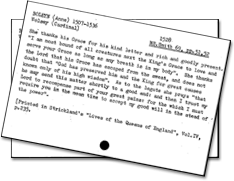 Alongside the harsh winter, Bennett also mentions a variety of people, places, events, and publications, and we are now in the process of capturing these references systematically across all cards using our catalogue’s powerful online editorial interface, EMLO Edit. The Duke of Marlborough, John Churchill – at the head of his army in the Spanish Netherlands over the winter of 1708/9 and midway between the battles of Oudenaarde and Malplaquet – is mentioned en passant, before Bennett turns his attention to more local matters. He speaks of David Gregory (1659-1708), Savilian professor of astronomy at Oxford from 1691 who had died three months previously, and makes an oblique reference to his successor (a quick search on Wikipedia reveals this to be John Caswell, who held office until his death in 1712). A new professor of poetry is mentioned, and he turns out to be another EMLO correspondent, Joseph Trapp (1679-1747) (the first postholder), and Bennett informs us that Henry Sacheverell (1674-1724) was in London during the cold spell and due to preach at St Paul’s. References to publications by Johan Ernest Grabe (1666-1711), the Königsberg-born divine who settled in Oxford and became a chaplain at Christ Church, and by our very own John Selden (1584-1654) are brought into the letter and, almost as an after-thought, Livy, Tully, and Homer are thrown in. This fascinating network of contexts and connections emerge from a single query regarding inclement weather.
Alongside the harsh winter, Bennett also mentions a variety of people, places, events, and publications, and we are now in the process of capturing these references systematically across all cards using our catalogue’s powerful online editorial interface, EMLO Edit. The Duke of Marlborough, John Churchill – at the head of his army in the Spanish Netherlands over the winter of 1708/9 and midway between the battles of Oudenaarde and Malplaquet – is mentioned en passant, before Bennett turns his attention to more local matters. He speaks of David Gregory (1659-1708), Savilian professor of astronomy at Oxford from 1691 who had died three months previously, and makes an oblique reference to his successor (a quick search on Wikipedia reveals this to be John Caswell, who held office until his death in 1712). A new professor of poetry is mentioned, and he turns out to be another EMLO correspondent, Joseph Trapp (1679-1747) (the first postholder), and Bennett informs us that Henry Sacheverell (1674-1724) was in London during the cold spell and due to preach at St Paul’s. References to publications by Johan Ernest Grabe (1666-1711), the Königsberg-born divine who settled in Oxford and became a chaplain at Christ Church, and by our very own John Selden (1584-1654) are brought into the letter and, almost as an after-thought, Livy, Tully, and Homer are thrown in. This fascinating network of contexts and connections emerge from a single query regarding inclement weather.
Miranda is editing metadata from the Bodleian card catalogue of correspondence for our union catalogue, Early Modern Letters Online. On a regular basis, she brings us hand-picked and contextualised records.
Launch Record of the Week
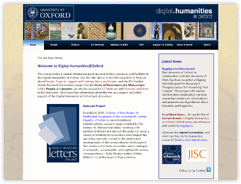 We were this week’s featured project on Digital.Humanities@Oxford, meaning a coveted front-page slot for a brief description of Cultures of Knowledge and the logo for our union catalogue, Early Modern Letters Online. Recently given a facelift and some important new functionality, DH@O is a central hub for information about relevant activities, resources, and activities in Oxford – one of the most established centres of digital humanities in the world – and features a growing relational database of people and projects involved.
We were this week’s featured project on Digital.Humanities@Oxford, meaning a coveted front-page slot for a brief description of Cultures of Knowledge and the logo for our union catalogue, Early Modern Letters Online. Recently given a facelift and some important new functionality, DH@O is a central hub for information about relevant activities, resources, and activities in Oxford – one of the most established centres of digital humanities in the world – and features a growing relational database of people and projects involved.
Elsevier, a world-leading provider of scientific, technical, and medical information products and services, and the Scaliger Institute of Leiden University Libraries have announced the founding of a three-year fellowship program to enable international rare books scholars to study century scientific scholarship and publishing in the early modern period. The program will support two scholars to work with the extensive Leiden University Special Collections and the Elsevier Heritage Collection – recently catalogued online – for a period of one to three months annually. They will also be invited to share their research through public lectures and publications. The closing date for applications is 1 March 2012. For further information and the application form please visit the websites of Elsevier or the Scaliger Institute. Please address queries to scaliger@library(at)leidenuniv.nl.
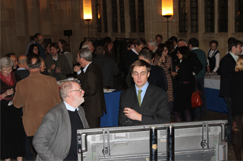
EMLO screenshots captivate the crowd.
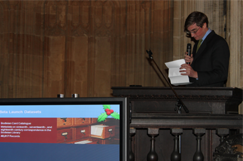
Chris Fletcher sets the scene.
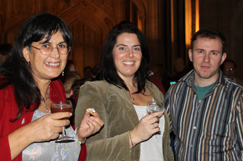
Festive designers and programmers.
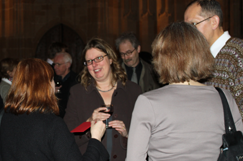
The Lister and Lhwyd research teams.
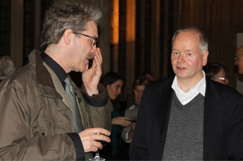
Stephen Clucas and Philip Beeley.
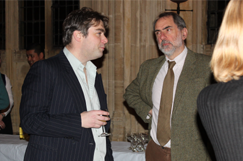
Will Poole and Richard Sharpe.
After a very busy year in private alpha, the Project celebrated the imminent public beta launch of our free union catalogue – Early Modern Letters Online − with a festive reception last Friday. Over eighty students, scholars, librarians, and digital humanists joined us in the historic environment of the Bodleian Library‘s Divinity School, where – over mulled wine, seasonal canapés, and mince pies – they were treated to contextual remarks from Dr Chris Fletcher (Keeper of Special Collections) and Professor Howard Hotson (Director of Cofk), and a full demonstration of the capabilities of the catalogue’s search and discovery, and editorial, interfaces by Project Coordinator Dr James Brown. Many thanks to everyone who contributed to the success of the evening, with a special shout-out to the Bodleian’s Wilma Minty for arranging things with her usual flair.
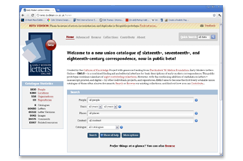
The EMLO homepage.
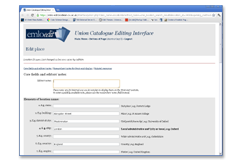
EMLO Edit, the editorial interface.
Early Modern Letters Online – which currently contains 60,480 epistolary records – federates basic metadata from eight contributing sources (including 48,695 sixteenth-, seventeenth-, and eighteenth-century records drawn from the existing card index of correspondence in the Bodleian Library), and allows for their manipulation and further enhancement by means of a sophisticated editorial environment. It will be available to the public from early January 2012.

 To stay informed, please watch this space or join the Mailing List. In the meantime, we wish you all a very Happy Holidays!
To stay informed, please watch this space or join the Mailing List. In the meantime, we wish you all a very Happy Holidays!
 A beta version of the correspondence of the sixteenth-century naturalist Carolus Clusius (1526-1609), developed by the Huygens ING (KNAW) and the Scaliger Institute (Leiden University Libraries), is now available online. Created with eLaborate, the online transcription platform developed by Huygens ING, the site currently features fully searchable transcriptions of 450 letters, but metadata on all known letters together with scans of 1,300 letters in the Leiden University Library are also included. Scholars in the field of the history of science, students of languages and paleography, and anyone seriously interested in the history of botany are invited to participate in the ongoing refinement of the resource, contributing new transcriptions, or improving existing texts. For further information and a link to the beta, please visit the Project webpage.
A beta version of the correspondence of the sixteenth-century naturalist Carolus Clusius (1526-1609), developed by the Huygens ING (KNAW) and the Scaliger Institute (Leiden University Libraries), is now available online. Created with eLaborate, the online transcription platform developed by Huygens ING, the site currently features fully searchable transcriptions of 450 letters, but metadata on all known letters together with scans of 1,300 letters in the Leiden University Library are also included. Scholars in the field of the history of science, students of languages and paleography, and anyone seriously interested in the history of botany are invited to participate in the ongoing refinement of the resource, contributing new transcriptions, or improving existing texts. For further information and a link to the beta, please visit the Project webpage.
 Much of the seventeenth century was blighted by conflict, and the Thirty Years’ War, which stretched the length and breadth of Europe, affected every aspect of life. The implications for educational institutions and resulting intellectual networks and traditions
Much of the seventeenth century was blighted by conflict, and the Thirty Years’ War, which stretched the length and breadth of Europe, affected every aspect of life. The implications for educational institutions and resulting intellectual networks and traditions 

 Alongside the harsh winter, Bennett also mentions a variety of people, places, events, and publications, and we are now in the process of capturing these references systematically across all cards using our catalogue’s powerful online editorial interface,
Alongside the harsh winter, Bennett also mentions a variety of people, places, events, and publications, and we are now in the process of capturing these references systematically across all cards using our catalogue’s powerful online editorial interface, 










 Join
Join 